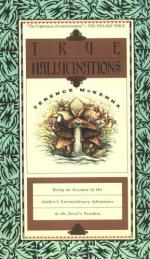|
This section contains 592 words (approx. 2 pages at 300 words per page) |

|
The word hallucinate is derived from the Greek halyein, meaning "to wander in mind." Hallucinations are perceptions that occur in the absence of a corresponding external sensory stimulus. They are experienced by the person who has them as immediate, involuntary, vivid, and real. They may involve any sensory system, and hence there are several types of hallucinations: auditory, visual, tactile (e.g., sensations on the skin), olfactory (smell), and gustatory (tastes). Visual hallucinations range from simple (e.g., flashes of light) to elaborate visions. Auditory hallucinations can be noises, a voice, or several voices carrying on a conversation. In command hallucinations, the voices often order the person to do things that at times involve acts of violence.
Hallucinations have been a hallmark of mental illness throughout history. They are an important clinical feature of several psychiatric conditions in which psychosis can occur, such as SCHIZOPHRENIA, manic-depressive illness, major...
|
This section contains 592 words (approx. 2 pages at 300 words per page) |

|


